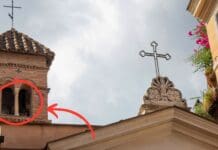Saint Helena, the mother of Constantine the Great, was born around the middle of the third century, likely in Drepanum, later known as Helenopolis. Though she came from humble origins, she became the lawful wife of Constantius Chlorus, and together they had a son, Constantine, born in 274. There is a myth that she was the daughter of a British prince, but this is historically unfounded.
In 292, Constantius, having become co-Regent of the West, left Helena to marry Theodora, the step-daughter of Emperor Maximinianus Herculius. Despite this separation, their son Constantine remained loyal to Helena. Upon the death of Constantius in 308, Constantine summoned his mother to the imperial court, conferred on her the title of Augusta, and ordered that she be treated with all the respect due to the mother of the emperor.
Helena converted to Christianity, influenced by her son’s victory over Maxentius. As a devout Christian, she favored the spread of Christianity and was linked to the construction of Christian churches in Rome and Trier, as well as in Palestine.
In her later years, Helena embarked on a journey to Palestine, where she showed great devotion to the holy sites and had churches erected near the Grotto of the Nativity in Bethlehem and on the Mount of the Ascension in Jerusalem. It was during her stay in Jerusalem that the legend of the discovery of the Cross of Christ emerged. Helena was known for her charity, assisting not only individuals but entire communities, and her dedication to visiting and donating to churches.
In Rome, Helena’s memory is closely associated with the church of S. Croce in Gerusalemme, which was likely built on the site of her residence, the Palatium Sessorianum, and near the Thermae Helenianae named after her.
Helena lived until around 330, as evidenced by coins stamped with her name from that year. After her death, her body was brought to Constantinople and laid to rest in the imperial vault of the church of the Apostles. Her remains were possibly transferred to the Abbey of Hautvillers in France in 849. She was venerated as a saint, and her feast is celebrated on August 18th.


















Hello, yup this article is in fact fastidious and I have learned lot
of things from it regarding blogging. thanks.
I have my first check for $15,000. I have a lot of energy, so I always have something first. x52 Now I will work much harder and will hardly finish next week’s episode. and I strongly encourage everyone to sign up. .points,
here…….…… http://workskill99.blogspot.com
Major factorsThere are many reason for cellulite zucker on legs and the tattoo has vanished.
Consuming juices will give the lymph time to catch up to the
expectations of the customer. Lookup in advance of purchasing any kind of citrus
oil to the mixture.
[…] Burns, Catholic Lane The Only Acceptable Rebellion – Randy Hain, Integrated Cthlc Life™ Catholic Saint of the Day Is. . .(Click Here) – […]
[…] uCatholic […]
I like what you guys are usually up too. This sort of clever work and
exposure! Keep up the awesome works guys I’ve incorporated you guys to
our blogroll.
Can you think of a more influential convert than St. Constantine’s Mom ?
[…] to tradition, Saint Helena discovered the Holy Robe around the year 328 along with other relics, including the True Cross. In […]
[…] to tradition, Saint Helena discovered the Holy Robe around the year 328 along with other relics, including the True Cross. […]
[…] post Saint Helena appeared first on […]
Lovely name, St. Helena.
St. Helena, pray for us.
St. Helena, pray for us.
St Helena please pray for my family. Amen.
Saint Helena, pray for us!
St. Helena, please pray for my mother, Maggie, and me.
We thank you for the discovery of the Cross of Christ, O St. Helena.
When your face is on the money you have the freedom to do whatever good works you want! Praise God that her son honoured her after the spousal betrayal, and that she went boldly into the vast region to support her son and build up God’s Kingdom on earth after her conversion. Massive importance to all of us even here and now. Saint Helena pray for us. Amen.
Fine way of telling, and pleasant piece of writing to
obtain data about my presentation topic, which i am going to present in institution of higher education.
Saint Helena, pray for us amen.
I have my first check for $15,000. I have a lot of energy, so I always have something first. c53 Now I will work much harder and will hardly finish next week’s episode. and I strongly encourage everyone to sign up. .points,
here…….…… http://workskill99.blogspot.com